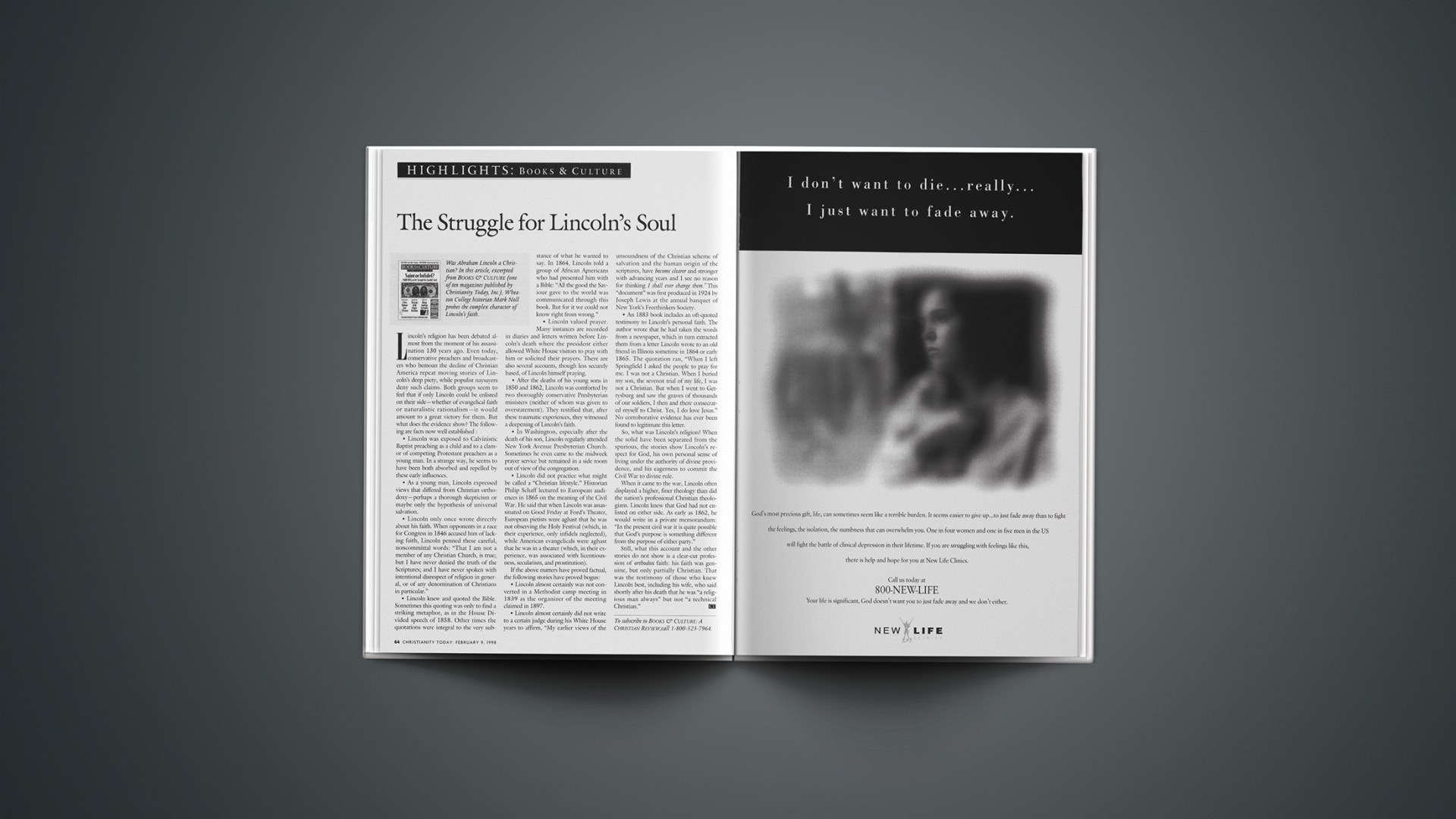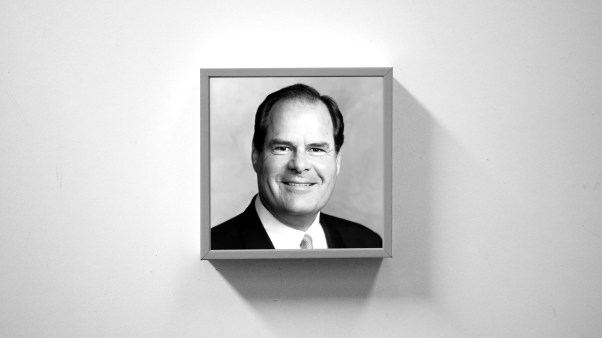Was Abraham Lincoln a Christian? In this article, excerpted from Books & Culture (one of the magazines published by Christianity Today), former Wheaton College historian and now Notre Dame historian Mark Noll probes the complex character of Lincoln's faith.
Lincoln's religion has been debated almost from the moment of his assassination 130 years ago. Even today, conservative preachers and broadcasters who bemoan the decline of Christian America repeat moving stories of Lincoln's deep piety, while populist naysayers deny such claims. Both groups seem to feel that if only Lincoln could be enlisted on their side—whether of evangelical faith or naturalistic rationalism—it would amount to a great victory for them. But what does the evidence show? The following are facts now well established:
—Lincoln was exposed to Calvinistic Baptist preaching as a child and to a clamor of competing Protestant preachers as a young man. In a strange way, he seems to have been both absorbed and repelled by these early influences.
—As a young man, Lincoln expressed views that differed from Christian orthodoxy—perhaps a thorough skepticism or maybe only the hypothesis of universal salvation.
—Lincoln only once wrote directly about his faith. When opponents in a race for Congress in 1846 accused him of lacking faith, Lincoln penned these careful, noncommittal words: "That I am not a member of any Christian Church, is true; but I have never denied the truth of the Scriptures; and I have never spoken with intentional disrespect of religion in general, or of any denomination of Christians in particular."
—Lincoln knew and quoted the Bible. Sometimes this quoting was only to find a striking metaphor, as in the House Divided speech of 1858. Other times the quotations were integral to the very substance of what he wanted to say. In 1864, Lincoln told a group of African Americans who had presented him with a Bible: "All the good the Saviour gave to the world was communicated through this book. But for it we could not know right from wrong."
—Lincoln valued prayer. Many instances are recorded in diaries and letters written before Lincoln's death where the president either allowed White House visitors to pray with him or solicited their prayers. There are also several accounts, though less securely based, of Lincoln himself praying.
—After the deaths of his young sons in 1850 and 1862, Lincoln was comforted by two thoroughly conservative Presbyterian ministers (neither of whom was given to overstatement). They testified that, after these traumatic experiences, they witnessed a deepening of Lincoln's faith.
—In Washington, especially after the death of his son, Lincoln regularly attended New York Avenue Presbyterian Church. Sometimes he even came to the midweek prayer service but remained in a side room out of view of the congregation.
—Lincoln did not practice what might be called a "Christian lifestyle." Historian Philip Schaff lectured to European audiences in 1865 on the meaning of the Civil War. He said that when Lincoln was assassinated on Good Friday at Ford's Theater, European pietists were aghast that he was not observing the Holy Festival (which, in their experience, only infidels neglected), while American evangelicals were aghast that he was in a theater (which, in their experience, was associated with licentiousness, secularism, and prostitution).
If the above matters have proved factual, the following stories have proved bogus:
—Lincoln almost certainly was not converted in a Methodist camp meeting in 1839 as the organizer of the meeting claimed in 1897.
—Lincoln almost certainly did not write to a certain judge during his White House years to affirm, "My earlier views of the unsoundness of the Christian scheme of salvation and the human origin of the scriptures, have become clearer and stronger with advancing years and I see no reason for thinking I shall ever change them." This "document" was first produced in 1924 by Joseph Lewis at the annual banquet of New York's Freethinkers Society.
—An 1883 book includes an oft-quoted testimony to Lincoln's personal faith. The author wrote that he had taken the words from a newspaper, which in turn extracted them from a letter Lincoln wrote to an old friend in Illinois sometime in 1864 or early 1865. The quotation ran, "When I left Springfield I asked the people to pray for me. I was not a Christian. When I buried my son, the severest trial of my life, I was not a Christian. But when I went to Gettysburg and saw the graves of thousands of our soldiers, I then and there consecrated myself to Christ. Yes, I do love Jesus." No corroborative evidence has ever been found to legitimate this letter.
So, what was Lincoln's religion? When the solid have been separated from the spurious, the stories show Lincoln's respect for God, his own personal sense of living under the authority of divine providence, and his eagerness to commit the Civil War to divine rule.
When it came to the war, Lincoln often displayed a higher, finer theology than did the nation's professional Christian theologians. Lincoln knew that God had not enlisted on either side. As early as 1862, he would write in a private memorandum: "In the present civil war it is quite possible that God's purpose is something different from the purpose of either party."
Still, what this account and the other stories do not show is a clear-cut profession of orthodox faith: his faith was genuine, but only partially Christian. That was the testimony of those who knew Lincoln best, including his wife, who said shortly after his death that he was "a religious man always" but not "a technical Christian."
Copyright © 1998 Christianity Today. Click for reprint information.










